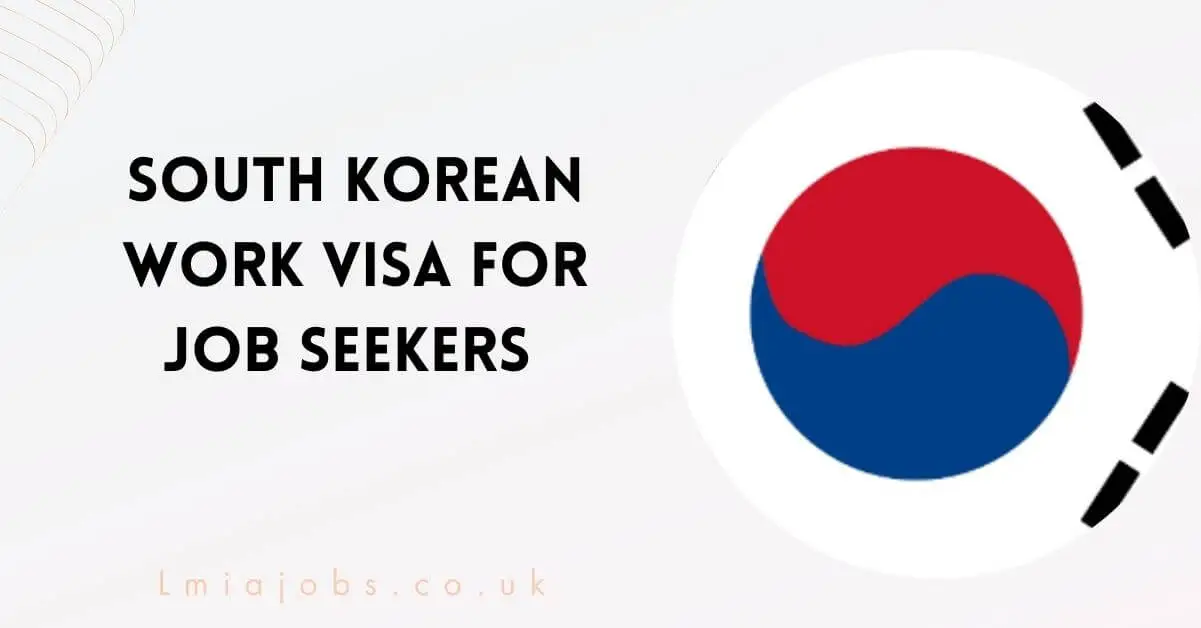Even though its population is getting older and birth rates are going down, South Korea stands out as a place with lots of opportunities in the world economy. This fast-paced country needs skilled workers right away to fill important gaps in its workforce, especially in technology, healthcare, and industry. This is a once-in-a-lifetime chance for talented people all over the world to build a successful job in one of Asia’s most exciting countries.
Imagine being at the center of groundbreaking technological advances, leading healthcare advances, or playing a key role in South Korea’s booming industries while also immersing yourself in the country’s rich cultural history and current way of life. This guide will show you the best ways to get your dream job in South Korea, the degrees and jobs that are in high demand, and the different types of visas you can get.
Why South Korea Needs You?
South Korea has trouble finding workers because its population is getting older and there aren’t many babies being born. Because of these things, there are big shortages in areas like science, agriculture, and manufacturing. To fill these gaps, the government has raised the number of visas available and is actively encouraging education in areas that are in high demand to bring in talented people from other countries.
Benefits of South Korean Work Visa for Job Seekers:
- Legal Employment: A South Korean work visa enables job seekers to legally operate in the country, thereby preventing legal complications and ensuring compliance with labor laws.
- Diverse Employment Opportunities: South Korea’s expanding industries, including technology, manufacturing, education (ESL teaching), and entertainment, provide a diverse array of employment opportunities for both skilled and menial workers.
- Competitive Salaries: South Korea offers competitive salaries, particularly in industries such as IT, engineering, and teaching, which guarantees financial stability for international workers.
- High Demand for Foreign Talent: The demand for foreign talent in South Korea is high, as the country is actively seeking foreign workers to fill positions in sectors such as healthcare, agriculture, engineering, and English teaching. This makes it simpler for job seekers to secure employment.
- Cultural Immersion: Individuals who possess a South Korean work visa are granted the opportunity to directly experience the South Korean culture, which encompasses its cuisine, traditions, festivals, and contemporary lifestyle.
- Opportunity to Learn Korean: The opportunity to acquire or enhance one’s Korean language skills is a valuable asset for future career prospects, and it is available to those who reside and work in South Korea.
- Public Services: Numerous work visas permit access to healthcare, public transportation, and other government services, thereby simplifying the process of residing and working in the country.
- Visa Sponsorship: Employers frequently offer visa sponsorship to foreign job applicants, which facilitates the administrative process and guarantees a seamless entry into the country.
- Permanent Residency Pathway: Long-term laborers who satisfy specific criteria may qualify for permanent residency (F-5 visa) through the use of certain work visas, including the E-7 (Skilled Worker Visa) or D-series visas.
- Work-Life Balance: South Korea guarantees that job seekers maintain a healthy work-life balance by providing reasonable working hours, mandatory pauses, and official holidays.
- Career Development and Networking: Employment in South Korea enables job seekers to establish a professional network in one of the most advanced economies in the world, thereby facilitating the pursuit of additional career opportunities.
Hot Jobs and Degrees in South Korea:
South Korea needs skilled workers in a lot of different areas because its economy is growing and its businesses are driven by innovation. Here are the degrees, jobs, and skills that people want, along with the average salaries for each:
In-Demand Degrees in South Korea are:
Medical and Healthcare:
- Specializations: Medicine, Nursing, Pharmacology
- Average Salary: 60-90 million KRW ($45,000 – $67,500) annually
- Key Roles: Doctors, Nurses, Pharmacists
STEM Fields (Science, Technology, Engineering, Mathematics):
- Specializations: Computer Science, Data Science, Robotics, AI, Cybersecurity
- Average Salary: 70-100 million KRW ($52,500 – $75,000) annually
- Key Roles: Software Developers, Data Scientists, AI Specialists, Cybersecurity Experts
Engineering:
- Specializations: Electrical, Mechanical, Civil, Software Engineering
- Average Salary: 60-90 million KRW ($45,000 – $67,500) annually
- Key Roles: Electrical Engineers, Mechanical Engineers, Civil Engineers, Software Engineers
High-Demand Professions in South Korea:
IT Professionals:
- Roles: Software Developers, Data Analysts, Cybersecurity Experts
- Average Salary: 50-80 million KRW ($37,500 – $60,000) annually
Healthcare Professionals:
- Roles: Doctors, Nurses, Pharmacists
- Average Salary: 60-90 million KRW ($45,000 – $67,500) annually
Engineers:
- Specializations: Software, Electrical, Mechanical, Civil
- Average Salary: 60-90 million KRW ($45,000 – $67,500) annually
High-Tech Manufacturing Specialists:
- Roles: Semiconductor Engineers, Robotics Technicians, Process Engineers
- Average Salary: 70-100 million KRW ($52,500 – $75,000) annually
Skill Shortage Trades in South Korea:
Manufacturing Trades:
- Roles: Machine Operators, Welders, Assembly Technicians
- Average Salary: 30-50 million KRW ($22,500 – $37,500) annually
Construction Trades:
- Roles: Carpenters, Electricians, Plumbers, Welders
- Average Salary: 40-60 million KRW ($30,000 – $45,000) annually
Agriculture:
- Roles: Farm Managers, Agricultural Technicians
- Average Salary: 30-50 million KRW ($22,500 – $37,500) annually
Navigating South Korean Work Visas Types Available:
South Korea has a number of work cards available to skilled foreign workers. Here is a list of the main types and what you need to do to be eligible for each one:
E-7 Visa (Specific Activities):
Subcategories:
- E-7-1: For people with at least a bachelor’s degree who work in engineering, medicine, the law, education, and other areas.
- E-7-2: For individuals with exceptional abilities in arts, sports, or other specialized fields.
- E-7-3: For People who invest in or start businesses that help the South Korean economy.
- E-7-4: On certain types of visas (E-9, E-10, or H-2) for skilled workers who have lived and worked legally in South Korea for at least four years.
Eligibility;
- Job Offer: An official job offer from a South Korean company.
- Qualifications: The right kind of education and job experience.
- Clear Criminal Record: You must show proof of not having a criminal record.
- Health Check: You have to get a medical check.
D-8 Visa (Corporate Investment):
Eligibility:
- Investment: Putting at least USD 70,000 into a South Korean business.
- Active Participation: You must take an active role in running the business.
- Relevant Field: The business must be in an area that matters because of the lack of skills.
D-9 Visa (Trade Management):
- Eligibility: Trade Managers: This section is for foreign trade managers who work for a Korean trading company or who want to start their own trading company in South Korea.
F-2 Visa (Residence):
- Subcategory: F-2-7: Points-based system for skilled workers.
- Eligibility: Points System: You get points based on your age, schooling, work experience, and how well you speak Korean. To qualify, you need to get a certain number of points.
F-4 Visa (Overseas Koreans):
- Eligibility: Ethnic Koreans: For ethnic Koreans (including those with foreign nationality) who can show Korean language proficiency or have specific skills.
Essential Requirements for All South Korean Work Visas:
- Job Offer: A job offer from a South Korean employer is typically required.
- Qualifications: Must meet the exact requirements for education and work experience for their visa category.
- Criminal Background Check: Must provide a clean criminal record.
- Health Check: Must pass a medical examination.
- Language Proficiency: For some types of visas, you may need to be able to speak and understand Korean, but it’s not always necessary.
Finding Your Dream Job in South Korea on Job Seeker VISA:
South Korea’s economy needs people with skills like yours, whether you are an engineer, work in healthcare, IT, or trades. Start your job search here:
List of New South Korean Government Job Portals:
- WorkNet (워크넷): This is the main job site of the Korean Ministry of Employment and Labor. It has many job openings.
- Seoul Global Center: Provides a wide range of services to foreigners living in Seoul, such as job listings and business guidance.
- Saramin (사람인): Another big job site with lots of job openings for people in the United States and other countries.
Conclusion:
South Korea has a lot to offer skilled professionals who want to move up in their jobs while also experiencing a rich cultural history and a modern way of life. South Korea is a great place for foreign talent to work because it needs more people with skills in technology, healthcare, and business.
By learning about the popular degrees, well-paying jobs, and different visa options, you can take advantage of the chances in this fast-paced country and start a successful career. South Korea is a great place to build your future if you work in IT, healthcare, engineering, or skilled trades. The economy is doing well, and the government is friendly.
Frequently Asked Questions:
Why is South Korea seeking skilled foreign workers?
South Korea is having trouble finding workers in key fields like technology, healthcare, and industry because its population is getting older and birth rates are low. This means that skilled foreign workers are needed.
What are the top in-demand degrees in South Korea?
In-demand degrees include Medicine, Nursing, Pharmacology, Computer Science, Data Science, Robotics, AI, Cybersecurity, Electrical Engineering, Mechanical Engineering, and Civil Engineering.
How much bank balance is required for South Korea work visa?
Bank Statement: The minimum balance is as as follows: The minimal bank balance required for a South Korea visa is ₹70,000 per individual in their bank account.
Duration: The bank statement ought to cover the most recent six months.






